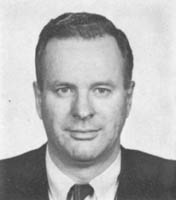John Wilkins
- 1967

Fellowship Title:
- Contemporary German Society
Fellowship Year:
- 1967
Some Words From Lower Saxony
Luneburg Federal German Republic July 3, 1967 John M. Wilkins is the 1967 Alicia Patterson Fund award winner, on leave from The Tacoma News Tribune. Permission to publish this article may be sought from The Managing Editor, The Tacoma News Tribune, Tacoma, Washington. Frau Gertraud Winkelvoss is a middle-aged housewife in Luneburg, a city of 60,000 in a heavily agricultural section of Lower Saxony. She is energetic and hospitable. She is well informed. She has a sense of humor, though it is tempered by a well controlled intensity that seems partly to come from bitterness. She does not fit the publicized “neo-Nazi” image of a National Democratic Party leader. But NPD she is; and a leader she is. She just returned to Luneburg from Hannover, capital of Lower Saxony, after being introduced to the state parliament (Landtag) as a new member, along with nine other members of this nationalistic party. There is only one other NPD Landtag member in the nation to be a woman, and there are no NPD members of either sex
The Generation of Lieutenants: In a Blind Alley?
Remagen Federal German Republic May 1967 John M. Wilkins is the 1967 Alicia Patterson Fund award winner, on leave from The Tacoma News Tribune. Permission to publish this article may be sought from The Managing Editor, The Tacoma News Tribune, Tacoma, Washington. My friend Reinhardt Pfundtner, of Darmstadt, apparently is the only one on my list of 10 former elite German youths not to have died in the armed forces of the Third Reich. Now almost 48, he won his city’s senior tennis championship during my visit there this May shortly after my arrival in Germany. In light of his background, the victory did not surprise me in the least. During one of his three periods as an escaped prisoner of war in Canada he had made his living as a semi-professional hockey player. (The war was just over, so during this period he wasn’t desperate to get back to Germany; he was merely trying to stay out of POW camp. But after his 1942 escape he went to Ottawa and tried to get
West Germany in the Morning
Heidelberg Federal German Republic May 1967 John M. Wilkins is the 1967 Alicia Patterson Fund award winner, on leave from The Tacoma News Tribune. Permission to publish this article may be sought from The Managing Editor, The Tacoma News Tribune, Tacoma, Washington. The finger of the 26-year-old German tapped on the photograph tentatively and his voice came slowly, entreating me to understand: “This man was not an evil man.” I looked down at the weekly journal he had placed on the table between us–the “NATIONAL ZEITUNG und Soldaten Zeitung.” The lead article asserted there is strong evidence that “high traitors” in the German General Staff, working with spies, mislead Hitler and Stalin into thinking the other was planning an attack in 1941 and thus caused the German invasion of Russia in order to bring the downfall of Hitler. Large paragraphs of the two dictators–with Hitler appearing at his kindliest–flanked the lead paragraphs. The young German again pointed at Hitler’s picture…“not evil, this man.” There was no doubt that the man talking was not evil.
